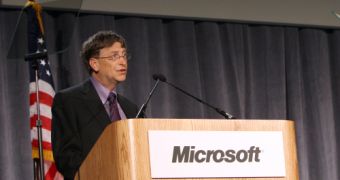Back on June 15th, 2006, Microsoft made public the plans for the two-year transition of Bill Gates out of his day-to-day role in the company. At that time, Gates revealed that his responsibilities would pass to Ray Ozzie and Craig Mundie. As a direct consequence, Ozzie, former Chief Technical Officer, took on the new role of Chief Software Architect, while Mundie, also a Chief Technical Officer at that time, became Microsoft's Chief Research and Strategy Officer. But Gates' work with the Redmond company also has another aspect, that has somewhat slipped into the background. Gates is simply a first hand inventor, and following his departure from the company in July 2008, he will leave behind a strong legacy of patents.
In a recent article for Office Online, describing his usage of the Office 2007 System, Gates describes, in general terms, the work he is now doing. "I spend the majority of my time communicating with colleagues, customers, and partners. As a result, Outlook is the application that I use the most. I receive about 100 e-mail messages per day from Microsoft employees, and many more from customers and partners", he explained. However, Gates did manage to leave out the fact that when he was not managing massive amounts of emails, he's busy... inventing. SeattlePI has an impressive list of over 20 patents co-signed by Gates, William H.
But, what is truly impressive about the list is the fact that the vast majority of the patents revolve around search and advertising. On both the search engine and the online advertising markets, Microsoft is lagging Google. And it is hard to believe that Gates' patents will be the catalyst for the Redmond company's search and advertising business. But at the same time, Microsoft, courtesy of the patents co-signed by Gates, is looking to use offline activity to enhance online searching, do localized marketing, perform scenario-based search, introduce an entity-specific search model, as well as a way to intelligently guiding search based on user dialog.
At the same time, the Redmond company has filled patents involving: search over designated content; search guided by location and context; Entity-specific search model; Context-based search, retrieval, and awareness; desktop search from mobile device, and so much more. Microsoft is currently hard at work to catch up with Google, but for the foreseeable future, the best that the company can hope to is the No. 2 position on both the search engine and the online advertising markets.

 14 DAY TRIAL //
14 DAY TRIAL //